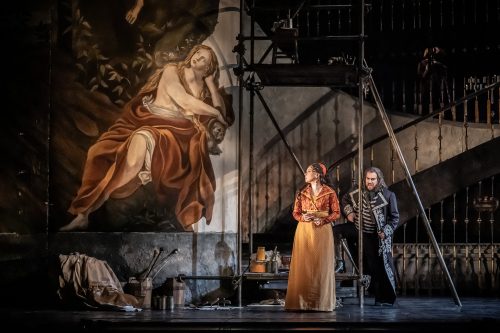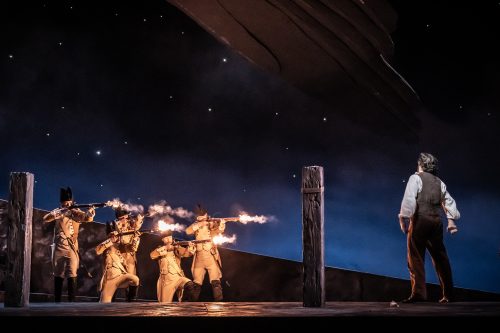 United Kingdom Puccini, Tosca: Soloists, Chorus and Orchestra of the Royal Opera House / Karen Kamensek (conductor). Royal Opera House, Covent Garden, 5.2.2024. (CC)
United Kingdom Puccini, Tosca: Soloists, Chorus and Orchestra of the Royal Opera House / Karen Kamensek (conductor). Royal Opera House, Covent Garden, 5.2.2024. (CC)

Production:
Director – Johnathan Kent
Revival director – Lucy Bradley
Designer – Paul Brown
Lighting designer – Mark Henderson
Chorus director – William Spaulding
Cast:
Tosca – Ausrine Stundyte
Cavaradossi – Marcello Puente
Cesare Angelotti – Grisha Martirosyan
Baron Scarpia – Gabriele Viviani
Sacristan – Henry Waddington
Spoletta – Didier Pieri
Sciarrone – Jamie Woollard
Young Shepherd – Madeleine McGhee
Gaoler – Olle Zetterström
This was, to put it mildly, a mixed Tosca. This opera seems not to have fared well in recent years at ’The Garden’; two years ago, I heard Angela Gheorghiu completely wreck the main role (I was reporting for another website). This time, it was not quite so straightforward: here, the failings were with the two major roles (Cavaradossi and Tosca herself); the star turns, strangely, resided in the smaller roles, and in the pit.
I had previously associated Karen Kamensek with the music of Philip Glass, and specifically with the opera Akhnaten (see my reviews of performances at English National Opera, latterly in 2023 here). She is no less fine in Puccini. There was a preternatural amount of detail audible; new layers were revealed, and the infamous unison horn line was superb, both in accuracy and in unified phrasing. The strings sounded lush and Romantic; the woodwind solos were dripping with character.
As the Sacristan, Henry Waddington was superb: full-voiced, and confident. The Cesare Angelotti, too – Grisha Martirosyan, a Jette Parker Artist with a fine career surely ahead of him – was magnificent. All boded well for a fabulous evening; and as the performance progressed, one noticed sterling contributions from Didier Pieri’s Spoletta, Jamie Woollard’s Sciarrone (another Jette Parker Artist), plus a superbly in-tune and clear, warm-toned Young Shepherd from Madeleine McGhee.
When it came to the three principals, though, all was not well. Ausrine Stundyte, who debuted at Covent Garden recently in a deputising capacity in the title role of Elektra. Stundyte is a fine actress, of that there is no doubt (her jealousy in the first act was palpable) but vocally she was less secure, and not above the odd swoop from one note to the next. Even the acting was not completely consistent, with her post-stabbing ‘Avanti a lui tremava tutta Roma’ counting for little or nothing.
Her Mario, Marcello Puente, was better but still not 100% within this massive role. The final act ‘O dolci mani’ found an unsteady tone that was verging on the unpleasant. Puente’s Act II cries of ‘Vittoria!’ were only really OK – no real spine-tingling affirmation of triumph and belief. Putting Stundyte and Puente together in the infamous unaccompanied octave passage in the final act (‘Trionfal, di nova speme’) was a moment of maximal discomfort. I am not sure many would recognise those intervals as octaves through the forest of vibrato. And, to compound matters, both Stundyte and Puente just sounded tired by the end.
As Scarpia, Gabriele Viviani was fine vocally, but the character’s core malice, whether internalised or externalised, was not really present, which led not only to less adrenalin in the second act but also less black gravitas in the first act ‘Te Deum,’ the opera’s great moment of spectacle. A far cry from Bryn Terfel’s awe-inspiring assumptions of this role.

The vital dynamics between the major characters were lost, therefore. Jonathan Kent’s production remains generally impressive, although it is difficult not to think of little lightbulbs instead of stars for the final act. Talking of the that act, I had not noticed before that one of the clouds looks like the wing of a bird (Tosca is repeatedly referred to as a ‘falcon’ in the opera). Revival Director Lucy Bradley honoured Kent’s vision well, with great lighting by Mark Henderson. The Royal Opera House’s chorus was in particularly fine form.
But a Tosca without adequate principals is, to mis-quote Boris Godunov, just a pie without filling. Overall, a disappointing evening. I do want to hear Kamensek in more Puccini, and in other repertoire, too, though.
Colin Clarke
